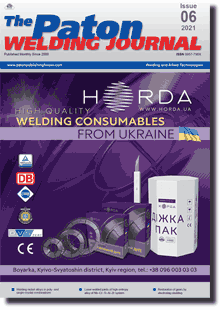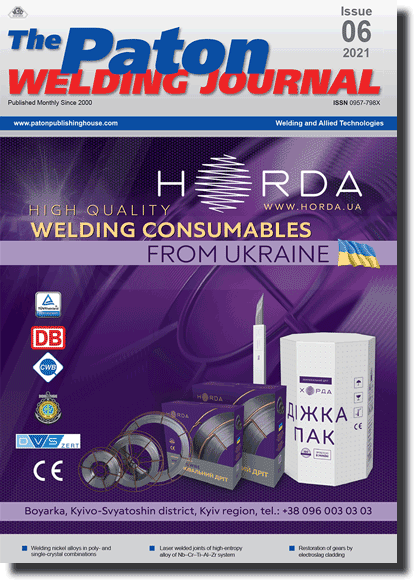| 2021 №06 (02) |
DOI of Article 10.37434/tpwj2021.06.03 |
2021 №06 (04) |

The Paton Welding Journal, 2021, #6, 19-25 pages
Modeling the action of electromagnetic field on the structure formation of joints welded under water
S.Yu. Maksymov, O.M. Berdnikova, O.O. Prilipko, T.O. Alekseyenko, Ye.V. Polovetskyi and A.A. Radzievska
E.O. Paton Electric Welding Institute of the NASU. 11 Kazymyr Malevych Str., 03150, Kyiv, Ukraine. E-mail: office@paton.kiev.ua
Abstract
In the developed computer application Proj5.exe the idea of a sequential calculation of values is realized, where the value of welding current/voltage and current/voltage in the inductor of external electromagnetic action is selected by the researcher. This allows increasing the efficiency of research works with a minimum number of underwater experiments. Using the obtained parameters of the external electromagnetic field, underwater deposits were performed on a plate of a low-alloy steel 09G2S using PPS-AN1 flux-cored wire. The studies showed that the use of external electromagnetic action facilitates a refinement of the grain structure of the deposited metal and reduction in the share of nonmetallic inclusions at their noticeable dispersion. In addition, in the metal of the heat-aftected-zone, the parameters of a package structure of bainite decrease and a more uniform level of microhardness during refinement of the substructure is observed. The external electromagnetic field significantly affects the dislocation structure of the metal, contributes to its uniform and gradient-free distribution, which causes a uniform level of dislocation strengthening in the local volumes of the structure and a decrease in the level of local inner stresses. 11 Ref., 7 Figures.
Keywords: underwater welding, welded joints, low-alloy steel, external electromagnetic action, microstructure, microhardness, lower and upper bainite, dislocations, local inner stresses
Received 14.04.2021
References
1. Ryzhov, R.N., Kuznetsov, V.D., Prilipko, E.A. (2005) Procedure of calculation of control electromagnetic action parameters in arc welding of structural steels. Vestnik NTTU KPI, 45, 176–177 [in Russian].2. Maksymov, S.Yu., Prilipko, E.A., Kozhukhar, V.I., Ryzhov, R.N. (2004) Application of external electromagnetic actions for improvement of mechanical properties of welds in underwater wet welding. The Paton Welding J., 11, 49–51.
3. Kosevich, F.M. (1978) Dislocations in theory of elasticity. Kiev, Naukova Dumka [in Russian].
4. Larikov, L.N., Falchenko, V.M. (1980) Influence of highspeed loading on mass transfer in iron. Influence of crystalline structure defects on diffusion and mass transfer at pulse action. Kiev, IPM, 30–32 [in Russian].
5. Tokij, V.V., Zajtsev, V.I., Filatov, B.P. (1973) About mechanism of formation of ordered dislocation structure of metals. Ukr. Fiz. Zh., 7, 1178–1181 [in Russian].
6. Tozoni, O.V. (1964) Mathematical models for calculation of electric and magnetic fields. Kiev, Naukova Dumka [in Russian].
7. Tozoni, O.V., Mayergojz, I.D. (1974) Calculation of three-dimensional fields. Kiev, Tekhnika [in Russian].
8. Petrushenko, E.I. (1966) Problem definition on calculation of eddy currents in bodies of arbitrary shape. Izv. Vuzov. Elektromekhanika, 11, 1181–1184 [in Russian].
9. Berdnikova, O.M., Maksymov, S.Yu., Prilipko, O.O. et al. (2021) Influence of external electromagnetic field on welded joint structure during underwater welding. FKhMM, 57(1), 60–68.
10. Maksymov, S.Yu., Berdnikova, O.M., Prilipko, O.O. et al. (2021) Influence of external electromagnetic field on parameters and defects of crystal lattice of metal of welded joints during underwater welding.The Paton Welding J., 1, 23-28. https://doi.org/10.37434/tpwj2021.01.05
11. Goldshtejn, M.I., Litvinov, V.S., Bronfin, B.M. (1986) Physics of metals of high-strength alloys. Moscow, Metallurgiya [in Russian].
Suggested Citation
S.Yu. Maksymov, O.M. Berdnikova, O.O. Prilipko, T.O. Alekseyenko, Ye.V. Polovetskyi and A.A. Radzievska (2021) Modeling the action of electromagnetic field on the structure formation of joints welded under water. The Paton Welding J., 06, 19-25.The cost of subscription/purchase order journals or individual articles
| Journal/Currency | Annual Set | 1 issue printed |
1 issue |
one article |
| TPWJ/USD | 384 $ | 32 $ | 26 $ | 13 $ |
| TPWJ/EUR | 348 € | 29 € | 24 € | 12 € |
| TPWJ/UAH | 7200 UAH | 600 UAH | 600 UAH | 280 UAH |
| AS/UAH | 1800 UAH | 300 UAH | 300 UAH | 150 UAH |
| AS/USD | 192 $ | 32 $ | 26 $ | 13 $ |
| AS/EUR | 180 € | 30 € | 25 € | 12 € |
| SEM/UAH | 1200 UAH | 300 UAH | 300 UAH | 150 UAH |
| SEM/USD | 128 $ | 32 $ | 26 $ | 13 $ |
| SEM/EUR | 120 € | 30 € | 25 € | 12 € |
| TDNK/UAH | 1200 UAH | 300 UAH | 300 UAH | 150 UAH |
| TDNK/USD | 128 $ | 32 $ | 26 $ | 13 $ |
| TDNK/EUR | 120 € | 30 € | 25 € | 15 € |
AS = «Automatic Welding» - 6 issues per year;
TPWJ = «PATON WELDING JOURNAL» - 12 issues per year;
SEM = «Electrometallurgy Today» - 4 issues per year;
TDNK = «Technical Diagnostics and Non-Destructive Testing» - 4 issues per year.


